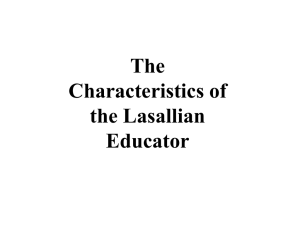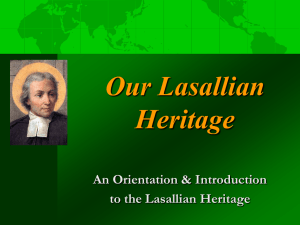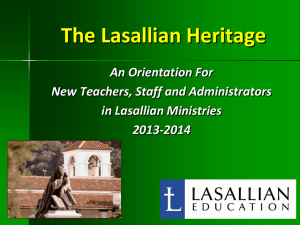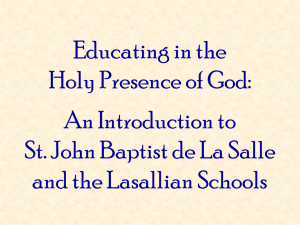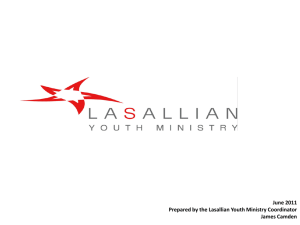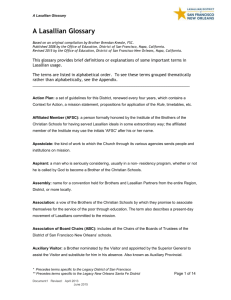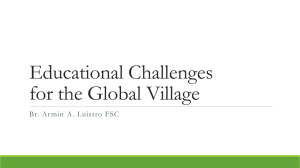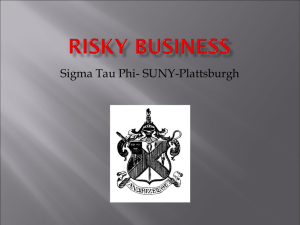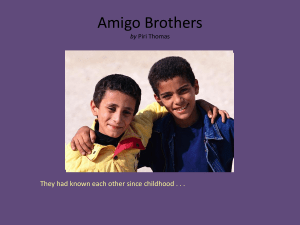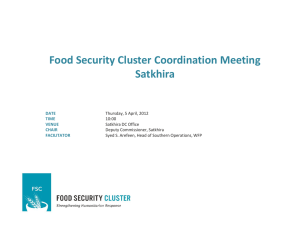Dr. Carmelita Quebengco
advertisement
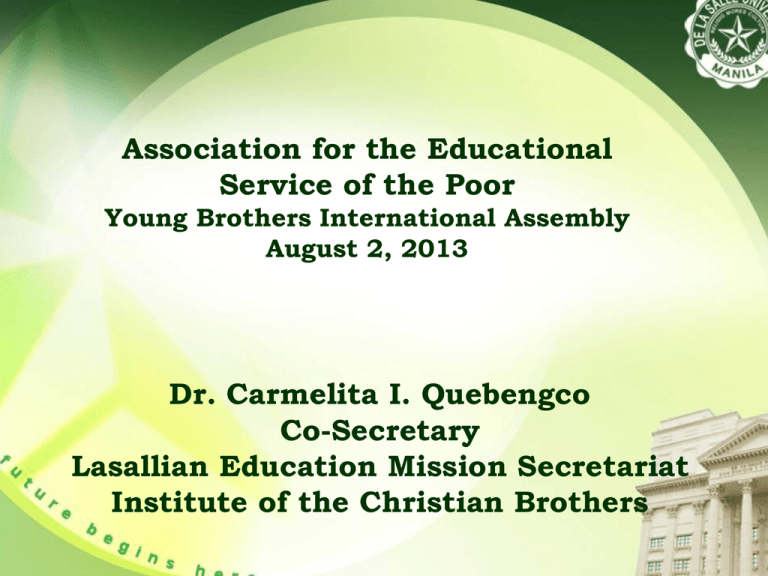
Association for the Educational Service of the Poor Young Brothers International Assembly August 2, 2013 Dr. Carmelita I. Quebengco Co-Secretary Lasallian Education Mission Secretariat Institute of the Christian Brothers Why Lasallian Association? Developing concepts/principles of human rights: Freedom Equality Human Integrity Renewed emphasis on the following in the Church: Church as “people of God” Important role of the Laity Unity in Diversity An inherent component of the Lasallian process in the conduct of the Lasallian Mission Realities: Decreasing number of clerics and religious Increasing number of ministries and people to serve Institute of the Christian Brothers Number of Schools Students Prof'l/Admin/Staff FSC Other Religious Lay Men Lay Women Total RELAF 89 38,732 RELAL PARC 297 184 330,400 231,880 241 56 1,519 697 2,486 668 164 14,943 17,882 33,657 217 69 8,878 9,938 19,102 RELAN 85 54,454 RELEM 400 280,997 TOTAL 1,055 936,463 157 42 2,180 1,747 4,126 480 57 13,623 16,259 30,419 1,736 388 41,143 46,523 89,790 Memento, Jan. 2013 FSC – 1,736 (1.93%) ; Others – 88,054 (98.07%) FSC + other Religious – 2,124 (2.36%) ; Lay Partners – 87,666 (97.63%) Lay Women – 51.81% Lay Men - 45.82% What is Lasallian Association? 1. Historical background: June, 1691 – St. La Salle + 2 Partners vowed to serve the poor youth 1694 – St. La Salle + 12 followers came together to consecrate themselves for life to the Christian education of poor boys 1986 Gen Chapter – Lasallian Family 1993 Gen. Chapter – Shared Mission – process by which certain people especially lay teachers share in the Lasallian educational mission along with the Brothers Lasallian Vocabulary IA 13 2000 Gen Chapter – Lasallian Association Fraternity… communion among equals… fraternity lived for the mission and shaped by the mission Br Miguel Campos, 2005 Working in solidarity and communion with one another… is central to the Bros’ Vocation and to the Lasallian mission as the educational service of poor students Gery Short, 2006 2007 Gen Chapter – Lasallian Association…Co-Responsibility Association is the communion of persons united in their commitment to the Lasallian Mission Br John Johnston, 2007 Association is uniting oneself to all those who are involved in the Lasallian mission of education; accepting joint responsibility for pursuing the goals of that mission especially for the poor, guided by the charism inherited from St. La Salle. Above all, it is a process of personal development, by which each individual appropriates the Lasallian identity, although the ways of living it out in concrete may vary Lasallian Vocabulary IA 13 People committed to the Lasallian Mission are free to define their personal process of Association. We can not impose… our goal is to discern together how each vocational response can be woven into a seamless garment of association for the Lasallian mission. Associated for the LS Mission… an act of Hope Various Meanings of Association: For St. La Salle – a fundamental intuition that allowed him to respond with apostolic zeal to God’s salvific plan for the young especially the poor…the link that unites all those committed to the Lasallian mission… those who see themselves responsible for it and who contribute to its vitality To the Brothers – a vow that forms part of their religious profession To some Partners/Lay LS – public expression after a process and according to the customs of the District To some Partners/lay LS – lived out implicitly through their commitment in the Lasallian mission according to the characteristics described in pertinent circulars Associated for the LS Mission… Expressions of Lasallian Association LS Association finds expression in: attitude of solidarity with other Lasallians in the conduct of the LS mission search for meaning and sustenance in Lasallian spirituality clear sense of belonging to the Lasallian story, the District and regular participation in its activities participate in some community experience with other Lasallians results from experience and is a dynamic journey not an acquired status an interest and openness to the universality of the Lasallian mission pre-supposes a freely mode commitment Br. Antonio Botana, Bulletin 5 LS Mission Communion/ Association In the Lasallian story a fruitful dialogue between mission and communion has been kept alive. Mission calls for communion Communion grows and becomes enthusiastic in serving the mission Communion makes itself a message for the mission The mission produces communion among those who come to serve it Br. Miguel Campos, Bulletin 2 Association Perspectives on LS Association “…the Lasallian mission is God’s work… it doesn’t matter whether it is a lay person or a Brother who is doing it, our focus should always be outward not inward, on these young people who need us” Woman LS Partner, PARC “I can not conceive of the idea of turning back, where the Brothers still feel like they are the owners of the Institute. The Lasallian Institute exists for the world and it should be shared in all its richness in order to enrich the world” FSC RELAL “We find a preoccupation with a sense of superiority in religious institutes between religious and lay people. Each group wants to keep the other at a distance so as to preserve, as far as possible, its own power and protect its own interest. This is just my own observation” Male LS Partner, RELAF “…the most important thing about our kind of education is the quality of the relationships we establish… the most important thing about our evangelization is to make each person feel loved by God, unique before his presence and responsible for others… the most important thing about our educational community is the experience of brotherhood and sisterhood that makes us builders not of walls but of bridges, making room for everyone without discrimination and being open to what they might teach us…”” Br. Alvaro, IA 13 Closing Remarks In Support of Lasallian Association Lasallian Intentional Groups: 1. Signum Fidei – (1975) the first born among LS associations…in Europe 2. Lasallian Fraternity in France (LS Third Order till 2001) – open community where members pray and meet regularly 3. Lasallian Association for Mission in Bristol (LAMB, 2001) – St. Gabriel Community in Clevedon – work groups living together in community 4. Galilee Community (since 1984), Valladolid, Spain – married couples with children, FSC and volunteers living together in community 5. LS Community in South Chicago – FSC, lay Partners, married couples living in community 6. Community of FSC and volunteers of El Salto, Durango North Mexico (1982) – live near one another but in 3 houses FSC Bulletin 2 - Association 7. Association of LS Volunteers of Cameroon (1992) – unmarried former students who live together in community 8. LS Volunteers of the Philippines (1994) – unmarried graduates living together in community in service of the LS mission 9. Community of Life with San Miguel Schools… in California, Baltimore, Chicago – Brothers and lay volunteers live in community near San Miguel Schools 10. Informal groups not living together in community Lasallian Partners for the Economically Poor (LPEP) Lasallian Association of Miguel Schools FSC Bulletins 2 and 3 Movement from Brothers to Lasallian Schools Region Francophone-Canada Yes* Decision Making Mission Councils 50% FSC ; 50% Partners United States Yes 25% FSC ; 75% Partners Yes** Yes in some Districts; More than 50% Partners In some Districts - 50% - 50%; not yet in others in others, more Brothers varies…depending on District but there is need for more Partner participation in some places Europe Proche-Orient Asia-Pacific Latin America Yes Africa *Non-formal education ministry **Except Poland for historical reasons General Councillors in Lasallian Regions identified the following as having facilitated the move from Brothers to Lasallian schools: Support of the church Strong Partner commitment to the Lasallian mission Strong Lasallian formation Success of Partner as leaders Clear definition of what is a LS School Decrease in number of FSC and increase in number of ministries and students Carmelita Quebengco Structures for LS Mission of the 21st Century Challenges of Lasallian Association From the Survey of Associates (2002) 1. Significant formative experience for Partners – sense of belonging in a Lasallian community/Brothers community 2. Some FSCs are reluctant to share authority with Partners 3. Some Partners are overly deferential to the Brothers reinforcing the clerical mentality 4. New structures yes, but not an assurance of association 5. Recognize life of Partners as different and with other commitments 6. Need for continuity of formation relevant to current realities 7. Provide more meaningful leadership opportunities Bulletin 5 Circular 461 counsels that we avoid extremes - ”an all Brother leadership team when there are many Brothers or phasing out ministries when there are very few of them” Br. Miguel Campos said “Association would assume a certain kind of demise of some kind of relationship we have had…an end to wanting to control everything, the feeling ourselves superior, to assuming that others depend on us. It would be an experience of new life that allows us to open ourselves to others, to listen to them, and be enriched by their contributions” Association was priority theme of the 44th Gen Chapter (2007) Lines of Action: 1. Create new structures that guarantee shared reflection and decision making 2. Accept the fact that the Brothers are not the only owners of the mission 3. Share responsibility and decision making capability related to association Challenges from Regional Reports IA 13 PARC develop effective association in multi-faith, multicultural environment some Districts find it hard to accept the new role of Partners in mission… need to listen, consult, collaborate with Partners RELAL develop processes for understanding association from the perspective of mission and the different Districts of the Region consolidate the representation of Brothers and Partners in mission structures RELAF create improved structures of leadership improve collaboration between Brothers and Partners develop a vision of Association as communion rather than as Brothers and Associates operating in parallel RELAN engage young Lasallians in association for mission identify, train, accompany future LS administrators and leaders continue developing structures that more fully call Brothers and Partners to exercise coresponsibility RELEN look for LS leaders to accompany groups in LS association for continuity establish more collegial climate and participation in decision making create mechanisms for solidarity to increase sense of belonging General Councillors in LS Regions identified factors that hindered the move from Brothers to LS schools: Some FSC see it as loss of power especially when an FSC is accountable to a Partner Lack of funds/resources for Partner formation Lack of rust for Partners Absence of vision to become a LS school National education policy of a country What is your Vision of Lasallian Association? The following are pertinent questions: Do you intend to turn the schools over to others who will conduct them without direct reference to our Lasallian heritage? OR Are you in the process of creatively, dynamincally, courageously creating structures that will assure that our institutions continue as Lasallian? Br. John Johnston, 2007 Gen Chapter Considering the declining number of Brothers, do we phase out ministries or do we join with lay Partners dedicated to the mission and continue the ministry? Circular 461, 2012 In a future without Brothers what structure will allow for the continuity of the Lasallian mission? RELEM Regional Report IA 13 What is the role of the young Brothers in this vision? What can the Institute do to make this vision a reality? Towards a new Lasallian Association story in 80 countries in 5 continents directly serving close to a million students
